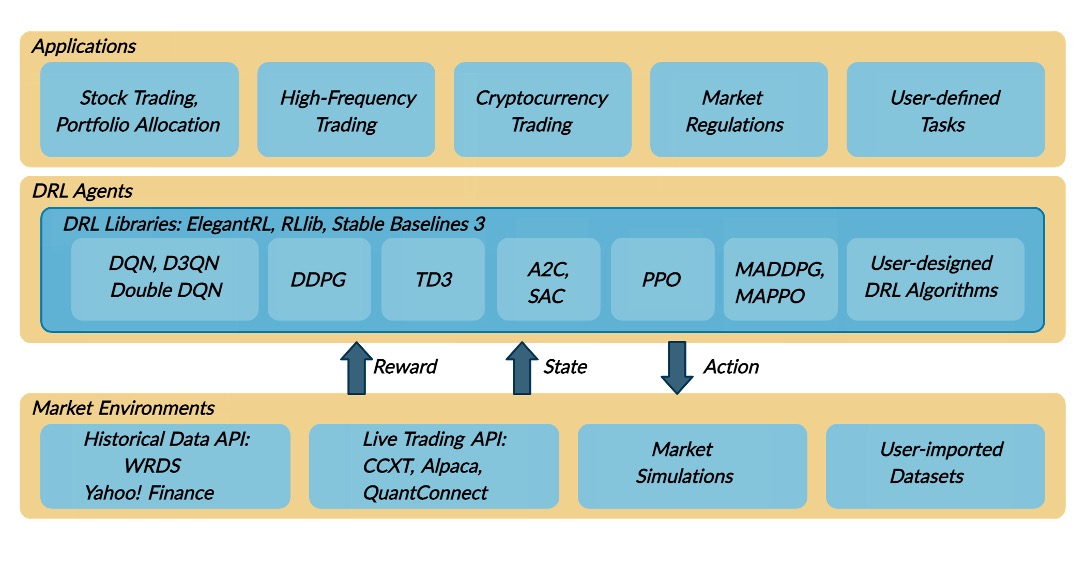Financial Reinforcement Learning (FinRL) (website) is the first open-source framework to exploit the great potential of deep reinforcement learning. FinRL has evolved into an ecosystem, including hundreds of financial markets, state-of-the-art algorithms, financial applications (portfolio allocation, cryptocurrency trading, high-frequency trading), cloud deployment, etc.
| Roadmap | Stage | Users | Project | Desription |
|---|---|---|---|---|
| 0.0 (Preparation) | entrance | practitioners | FinRL-Meta | gym-style market environments |
| 1.0 (Proof-of-Concept) | full-stack | developers | this repo | pipeline |
| 2.0 (Professional) | profession | experts | ElegantRL | algorithms |
| 3.0 (Production) | service | hedge funds | Podracer | cloud-native deployment |
- Overview
- File Structure
- Supported Data Sources
- Installation
- Status Update
- Contributions
- Tutorials
- Publications
- News
- Citing FinRL
- Welcome Contributions
- Sponsorship
- LICENSE
FinRL has three layers: market environments, agents, and applications. For a trading task (on the top), an agent (in the middle) interacts with a market environment (at the bottom), making sequential decisions.
Run Stock_NeurIPS2018.ipynb for a quick start.
A video FinRL at the AI4Finance Youtube Channel.
The main folder finrl has three subfolders applications, agents, meta.
We employ a train-test-trade pipeline with three files: train.py, test.py, and trade.py.
FinRL
├── finrl (main folder)
│ ├── applications
│ ├── cryptocurrency_trading
│ ├── high_frequency_trading
│ ├── portfolio_allocation
│ └── stock_trading
│ ├── agents
│ ├── elegantrl
│ ├── rllib
│ └── stablebaseline3
│ ├── meta
│ ├── data_processors
│ ├── env_cryptocurrency_trading
│ ├── env_portfolio_allocation
│ ├── env_stock_trading
│ ├── preprocessor
│ ├── data_processor.py
│ ├── meta_config_tickers.py
│ └── meta_config.py
│ ├── config.py
│ ├── config_tickers.py
│ ├── main.py
│ ├── plot.py
│ ├── train.py
│ ├── test.py
│ └── trade.py
│
├── tutorials (educational notebook files)
├── tests (unit tests to verify codes on env & data)
│ ├── environments
│ └── test_env_cashpenalty.py
│ └── downloaders
│ ├── test_yahoodownload.py
│ └── test_alpaca_downloader.py
├── setup.py
├── requirements.txt
└── README.md
| Data Source | Type | Range and Frequency | Request Limits | Raw Data | Preprocessed Data |
|---|---|---|---|---|---|
| Alpaca | US Stocks, ETFs | 2015-now, 1min | Account-specific | OHLCV | Prices&Indicators |
| Baostock | CN Securities | 1990-12-19-now, 5min | Account-specific | OHLCV | Prices&Indicators |
| Binance | Cryptocurrency | API-specific, 1s, 1min | API-specific | Tick-level daily aggegrated trades, OHLCV | Prices&Indicators |
| CCXT | Cryptocurrency | API-specific, 1min | API-specific | OHLCV | Prices&Indicators |
| IEXCloud | NMS US securities | 1970-now, 1 day | 100 per second per IP | OHLCV | Prices&Indicators |
| JoinQuant | CN Securities | 2005-now, 1min | 3 requests each time | OHLCV | Prices&Indicators |
| QuantConnect | US Securities | 1998-now, 1s | NA | OHLCV | Prices&Indicators |
| RiceQuant | CN Securities | 2005-now, 1ms | Account-specific | OHLCV | Prices&Indicators |
| Tushare | CN Securities, A share | -now, 1 min | Account-specific | OHLCV | Prices&Indicators |
| WRDS | US Securities | 2003-now, 1ms | 5 requests each time | Intraday Trades | Prices&Indicators |
| YahooFinance | US Securities | Frequency-specific, 1min | 2,000/hour | OHLCV | Prices&Indicators |
OHLCV: open, high, low, and close prices; volume. adjusted_close: adjusted close price
Technical indicators: 'macd', 'boll_ub', 'boll_lb', 'rsi_30', 'dx_30', 'close_30_sma', 'close_60_sma'. Users also can add new features.
- Install description for all operating systems (MAC OS, Ubuntu, Windows 10)
- FinRL for Quantitative Finance: Install and Setup Tutorial for Beginners
Version History [click to expand]
- 2021-08-25 0.3.1: pytorch version with a three-layer architecture, apps (financial tasks), drl_agents (drl algorithms), neo_finrl (gym env)
- 2020-12-14 Upgraded to Pytorch with stable-baselines3; Remove tensorflow 1.0 at this moment, under development to support tensorflow 2.0
- 2020-11-27 0.1: Beta version with tensorflow 1.5
- FinRL is the first open-source framework to demonstrate the great potential of financial reinforcement learning. It has evolved into an ecosystem.
- The application layer provides interfaces for users to customize FinRL to their own trading tasks. Automated backtesting tool and performance metrics are provided to help quantitative traders iterate trading strategies at a high turnover rate. Profitable trading strategies are reproducible and hands-on tutorials are provided in a beginner-friendly fashion. Adjusting the trained models to the rapidly changing markets is also possible.
- The agent layer provides state-of-the-art DRL algorithms that are adapted to finance with fine-tuned hyperparameters. Users can add new DRL algorithms.
- The environment layer includes not only a collection of historical data APIs, but also live trading APIs. They are reconfigured into standard OpenAI gym-style environments. Moreover, it incorporates market frictions and allows users to customize the trading time granularity.
- [Towardsdatascience] Deep Reinforcement Learning for Automated Stock Trading
A complete list at blogs
| Title | Conference | Link | Citations | Year |
|---|---|---|---|---|
| FinRL-Meta: FinRL-Meta: Market Environments and Benchmarks for Data-Driven Financial Reinforcement Learning | NeurIPS 2022 | paper code | 1 | 2022 |
| FinRL: Deep reinforcement learning framework to automate trading in quantitative finance | ACM International Conference on AI in Finance (ICAIF) | paper | 19 | 2021 |
| FinRL-Podracer: High performance and scalable deep reinforcement learning for quantitative finance | ACM International Conference on AI in Finance (ICAIF) | paper code | 8 | 2021 |
| Explainable deep reinforcement learning for portfolio management: An empirical approach | ACM International Conference on AI in Finance (ICAIF) | paper code | 3 | 2021 |
| FinRL: A deep reinforcement learning library for automated stock trading in quantitative finance | NeurIPS 2020 Deep RL Workshop | paper | 46 | 2020 |
| Deep reinforcement learning for automated stock trading: An ensemble strategy | ACM International Conference on AI in Finance (ICAIF) | paper code | 84 | 2020 |
| Practical deep reinforcement learning approach for stock trading | NeurIPS 2018 Workshop on Challenges and Opportunities for AI in Financial Services | paper code | 113 | 2018 |
- [央广网] 2021 IDEA大会于福田圆满落幕:群英荟萃论道AI 多项目发布亮点纷呈
- [央广网] 2021 IDEA大会开启AI**盛宴 沈向洋理事长发布六大前沿产品
- [IDEA新闻] 2021 IDEA大会发布产品FinRL-Meta——基于数据驱动的强化学习金融风险模拟系统
- [知乎] FinRL-Meta基于数据驱动的强化学习金融元宇宙
- [量化投资与机器学习] 基于深度强化学习的股票交易策略框架(代码+文档)
- [运筹OR帷幄] 领读计划NO.10 | 基于深度增强学习的量化交易机器人:从AlphaGo到FinRL的演变过程
- [深度强化实验室] 【重磅推荐】哥大开源“FinRL”: 一个用于量化金融自动交易的深度强化学习库
- [商业新知] 金融科技讲座回顾|AI4Finance: 从AlphaGo到FinRL
- [Kaggle] Jane Street Market Prediction
- [矩池云Matpool] 在矩池云上如何运行FinRL股票交易策略框架
- [财智无界] 金融学会常务理事陈学彬: 深度强化学习在金融资产管理中的应用
- [Neurohive] FinRL: глубокое обучение с подкреплением для трейдинга
- [ICHI.PRO] 양적 금융을위한 FinRL: 단일 주식 거래를위한 튜토리얼
@article{liu2022finrl_meta,
title={FinRL-Meta: Market Environments and Benchmarks for Data-Driven Financial Reinforcement Learning},
author={Liu, Xiao-Yang and Xia, Ziyi and Rui, Jingyang and Gao, Jiechao and Yang, Hongyang and Zhu, Ming and Wang, Christina Dan and Wang, Zhaoran and Guo, Jian},
journal={NeurIPS},
year={2022}
}
@article{liu2021finrl,
author = {Liu, Xiao-Yang and Yang, Hongyang and Gao, Jiechao and Wang, Christina Dan},
title = {{FinRL}: Deep reinforcement learning framework to automate trading in quantitative finance},
journal = {ACM International Conference on AI in Finance (ICAIF)},
year = {2021}
}
@article{finrl2020,
author = {Liu, Xiao-Yang and Yang, Hongyang and Chen, Qian and Zhang, Runjia and Yang, Liuqing and Xiao, Bowen and Wang, Christina Dan},
title = {{FinRL}: A deep reinforcement learning library for automated stock trading in quantitative finance},
journal = {Deep RL Workshop, NeurIPS 2020},
year = {2020}
}
@article{liu2018practical,
title={Practical deep reinforcement learning approach for stock trading},
author={Liu, Xiao-Yang and Xiong, Zhuoran and Zhong, Shan and Yang, Hongyang and Walid, Anwar},
journal={NeurIPS Workshop on Deep Reinforcement Learning},
year={2018}
}
We published FinTech papers. Please check Google Scholar. Closely related papers are given in the list.
Welcome to AI4Finance community!
Discuss FinRL via AI4Finance mailing list and AI4Finance Slack channel:

Please check Contributing Guidances.
Thank you!
Welcome gift money to support AI4Finance, a non-profit community.
Network: USDT-TRC20
MIT License
Disclaimer: Nothing herein is financial advice, and NOT a recommendation to trade real money. Please use common sense and always first consult a professional before trading or investing.










